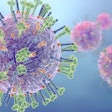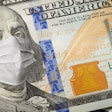
Masking should continue in healthcare settings to optimize patient safety, according to infectious disease experts Dr. Tara N. Palmore at George Washington University School of Medicine and Dr. David K. Henderson at the National Institutes of Health (NIH).
Their commentary was published Tuesday in the journal Annals of Internal Medicine.
With the COVID-19 public health emergency now lifted, hospitals are left to decide how to de-escalate mitigation strategies. “As healthcare facilities approach this crossroad, we urge their leaders to take stock of what we have learned regarding masking and patient safety,” recommend the authors.
Masking became a controversial mitigation strategy during the COVID-19 pandemic, primarily because the topic was highly politicized. In addition, high-quality evidence of masking’s efficacy was lacking, due to suboptimal adherence to mask-wearing in virtually all published studies.
“Demonstrating that masks work is difficult when they are not worn consistently,” the authors noted.
Nevertheless, real-world experience demonstrates the effectiveness of mask-wearing in clinical settings, they noted. Transmission from patient-to-staff and staff-to-patient when both are masked is uncommon. “A striking finding was the remarkable reduction in the healthcare-associated transmission of virtually all respiratory viruses, not simply SARS-CoV-2, in our institutions,” noted the authors. “Laboratory studies have done what clinical research has not and demonstrated that surgical masks … are effective in limiting the spread of aerosols and droplets from individuals infected with influenza, coronaviruses, and other respiratory viruses. Although not 100% effective, they substantially reduce quantities of virus expelled during coughing or talking, thereby mitigating risk.”
The argument for mask-wearing in clinical settings becomes even stronger given the tendency of healthcare personnel to show up for work even when sick — a behavior called presenteeism. “Healthcare personnel are notorious for coming to work while ill,” observe the authors. “Presenteeism has been well documented in healthcare-associated respiratory viral outbreaks, with various reasons proffered, including an unwillingness to place burdens on colleagues, a belief that some respiratory infections may be trivial, a fear of reprisal for absenteeism, a moral imperative to provide patient care, and, for those in some roles, a lack of paid sick leave. We can find no reason to believe these time-honored behaviors will change if masks come off.”
Asymptomatic people also transmit respiratory viruses, particularly SARS-CoV-2. “Up to a third of Omicron infections are asymptomatic — but could nonetheless cause severe or life-threatening disease or prolonged illness if transmitted to immunologically vulnerable patients,” noted the authors. “Hospitals serving elderly and immunocompromised patients, such as oncology patients and stem-cell and organ transplant recipients, face challenges when deescalating measures that protect these patient populations.”
Universal masking may not be the only valid approach. The authors offer other reasonable options, including masking only during respiratory virus season, beginning in the fall; masking on wards housing patients at higher risk for respiratory virus infections; or masking staff and visitors but allowing optional masking for patients.
“The most concrete pitfalls of masks, such as impeding communication and negatively affecting empathy, should become fodder for engineers and developers to improve or redesign masks to obviate these issues,” the authors suggest.



















